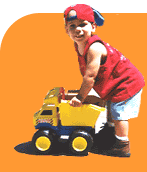
| Home |
| Unpreschooling |
| Resources for twos |
| Stuff to do age two |
| Skills lists |
| Curricula we've used |
| Suzuki violin |
| Journal |
| Mindful mothering |
| Homegrown kids |
| About the author |
| Email me |


The Wonderful, Wacky World of "Unpreschooling"Written by Celeste Land 1|2|3Doubting one's ability to teach Prospective homeschooling parents often doubt their ability to teach their own children. Unpreschooling parents often share these doubts with a greater intensity because they have less experience watching their children grow and learn. They may think that abstract concepts such as colors, letters, numbers, and shapes can only be acquired through formal instruction. They may not be aware of how many educational toys, tools, and experiences they already have right in their own home. Veteran homeschoolers can help by sharing their own experiences with their very young children (including how they overcame their early doubts and fears), and by sharing resources especially designed for facilitating learning in the early years. See Celeste's recipe for success included with this article. SocializationLike most beginning homeschoolers, unpreschooling parents are concerned about "socialization." Unpreschooling parents worry about whether their children will acquire social skills without formal instruction. To complicate matters, very young children by definition are prone to anti-social behaviors (tantrums, disobedience, not sharing, inability to participate in groups, not following directions, hitting, biting, etc. etc.) which may seem to have no end in sight. Veteran homeschoolers can help by sharing their own experiences about how their children gradually learned social skills over time with plenty of loving guidance from their families. Support groups may want to consider adding their favorite books on toddler discipline issues to their group libraries. Unpreschooled children rely on their parents to find them playmates and friends. Unfortunately, many families with very young children find it difficult to find playmates who are neither in daycare, preschool, or both. Organized recreation center classes and their ilk are often unsuitable for this age group, since many children under age 5 are not yet ready to separate from their parents or to participate in a structured group experience. The mixed-age gatherings typical of many homeschooling support groups can be beneficial for very young children, but sometimes the unpreschoolers get lost between the cracks, being too old to sit quietly in mom's arms and too young to keep up with the school-aged kids. Often what the parents of unpreschoolers really crave is a support group or playgroup just for families with similarly-aged children. Parents of very young children often are not familiar with their community's resources, and may not know how to network with other families at home. Veteran homeschoolers can help by directing families to appropriate support groups when they exist, or by helping interested families to start their own groups. A successful unpreschooling group needn't be complicated or fancy - three or four families meeting weekly at a home or park to play, talk, and possibly do a short project together, can be all that is required. Homeschooling Burnout"Burnout" is a common concern for all homeschooling families. Parents of very young children are especially prone to burnout, since their children's needs are so intense. "Finding time for oneself" can be almost impossible in a home filled with babies, toddlers, or preschoolers - or all three. Veteran homeschoolers can share creative and resourceful ideas and strategies for how to run a household, run errands, pursue a favorite hobby or pastime, get exercise, or just relax with young children in tow. MORE>> Skills lists | Curricula we've used | Suzuki violin | Journal Mindful mothering | Homegrown kids | About the author Email me| |